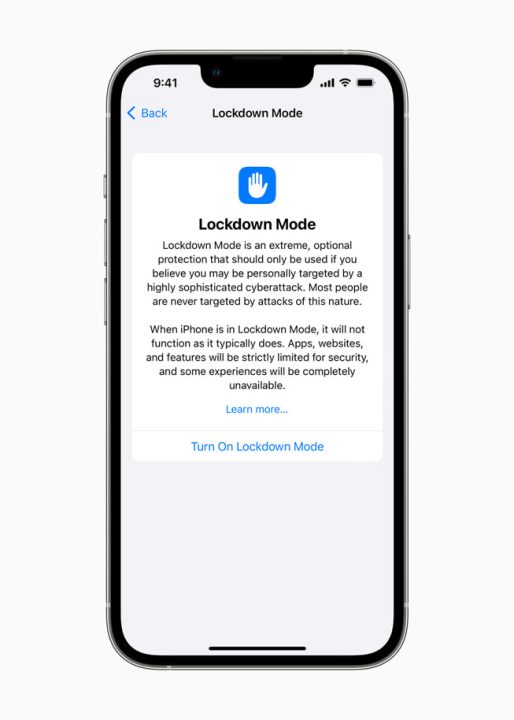Apple on Wednesday said it will roll out a new security feature designed to protect journalists, human rights advocates, activists, and other targets from state-sponsored espionage and sophisticated hacking attacks.
The feature called “Lockdown Mode” will be publicly released to the iPhone, iPad, and Mac around September, and currently it’s in testing phase by developers. Turning the feature on will block most incoming attachments and link previews sent to the iPhone Messages app, potentially hackable web browsing technologies, and incoming FaceTime calls from unknown contacts. Even wired connections with a computer or an accessory are blocked when iPhone is locked.

Photo/ Apple
The move ensued when at least two Israeli firms have exploited flaws in Apple’s software to remotely break into iPhones without the user needing to tap or click on anything. Apple is suing NSO Group, the maker of the “Pegasus” spyware which is believed to have been used to attack a small number of iPhone users worldwide. The group is already placed on trade blacklist by U.S. officials
“While the vast majority of users will never be the victims of highly targeted cyberattacks, we will work tirelessly to protect the small number of users who are,” said Apple head of security engineering Ivan Krstic in a statement.
“Lockdown Mode is a groundbreaking capability that reflects our unwavering commitment to protecting users from even the rarest, most sophisticated attacks,” it added.

Photo/ Apple
The tech giant ups the ‘bug bounty’ to a maximum of USD 2 million to pay its researchers in improvement of the Lockdown Mode and finding any vulnerabilities in it. Apple said it was the highest bounty payout in the industry.
Apple said it is also making a USD 10 million grant to the Dignity and Justice Fund, established by the Ford Foundation, to help support human rights and fight social repression.
Source: Apple Newsroom

YugaTech.com is the largest and longest-running technology site in the Philippines. Originally established in October 2002, the site was transformed into a full-fledged technology platform in 2005.
How to transfer, withdraw money from PayPal to GCash
Prices of Starlink satellite in the Philippines
Install Google GBox to Huawei smartphones
Pag-IBIG MP2 online application
How to check PhilHealth contributions online
How to find your SIM card serial number
Globe, PLDT, Converge, Sky: Unli fiber internet plans compared
10 biggest games in the Google Play Store
LTO periodic medical exam for 10-year licenses
Netflix codes to unlock hidden TV shows, movies
Apple, Asus, Cherry Mobile, Huawei, LG, Nokia, Oppo, Samsung, Sony, Vivo, Xiaomi, Lenovo, Infinix Mobile, Pocophone, Honor, iPhone, OnePlus, Tecno, Realme, HTC, Gionee, Kata, IQ00, Redmi, Razer, CloudFone, Motorola, Panasonic, TCL, Wiko
Best Android smartphones between PHP 20,000 - 25,000
Smartphones under PHP 10,000 in the Philippines
Smartphones under PHP 12K Philippines
Best smartphones for kids under PHP 7,000
Smartphones under PHP 15,000 in the Philippines
Best Android smartphones between PHP 15,000 - 20,000
Smartphones under PHP 20,000 in the Philippines
Most affordable 5G phones in the Philippines under PHP 20K
5G smartphones in the Philippines under PHP 16K
Smartphone pricelist Philippines 2024
Smartphone pricelist Philippines 2023
Smartphone pricelist Philippines 2022
Smartphone pricelist Philippines 2021
Smartphone pricelist Philippines 2020